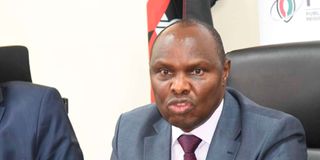Ruto slams brakes on wastage by board members

Chief of Staff and Head of Public Service Felix Kipatarus Koskei.
President William Ruto has moved to stop extravagant expenditures by board members in parastatals after it emerged that they were making unnecessary demands at the expense of taxpayers.
Several board members are said to have been demanding posh offices, facilitations to visit projects and high-end vehicles gobbling millions of taxpayers’ money yet they hold part-time jobs.
Some of the board members are also demanding involvement in the day-to-day running of the State corporations.
In a letter dated April 3, Chief of Staff and Head of the Public Service Felix Koskei revealed the anomaly and ordered the boards to restrict themselves to their mandate of policy formulation and oversight.
Mr Koskei directed all the Cabinet Secretaries and Principals Secretaries to ensure State corporations under their ministries are guided by the Mwongozo that spells out the code of governance for State corporations.
“The office has received information to the effect that some boards of directors are unduly performing executive functions. These include engagement in internal management controls and operations and deployment of staff and routine project inspection,” Mr Koskei stated in the letter.
He added, “We have also noted an enhanced demand for elaborate facilitation including offices, vehicles, and equipment outside of approved provision, despite the part time status of these positions.”
Some of the board members are said to be using their influence in the appointment of Chief Executive Officers to blackmail them into yielding to their extravagant demands.
The country has a total of 248 State corporations, out of which 46 are commercial enterprises, and 201 are non-commercial entities. Majority of them are occupied by August 2022 poll losers, some of who have served in political offices.
According to Mwongozo, the boards are mandated to oversee the overall strategy and approve significant policies of the parastatals and ensure they are aligned. The board members are also required to meet regularly as required and at least quarterly in order to effectively lead the parastatals.
Mr Koskei said the board chairpersons, in particular, have to refrain from engaging in day-to-day operations of the corporations, and direct their members accordingly.
He said that the boards are expected to have in place necessary mechanisms for management to report on executive actions for purposes of oversight, including the use of the internal audit function.
To secure strict compliance, Mr Koskei has directed PSs to convene meetings of their respective state corporations to bring to an end the wanton wastage in the offices.
“Principal Secretaries are directed to bring this matter as a substantive agenda item in the next scheduled board meeting of their respective State corporations, and report back on the resolutions adopted thereto,” he directed.
Mr Koskei further directed CSs and corporation boards to seek clearance with his office before appointing or renewing appointments of Chief Executive Officers of respective parastatals.
According to Mwongozo guidelines, the mandate of board directors is limited to policy formulation while the chief executive officer remains in charge of implementation and management of day-to-day affairs of the corporations.





